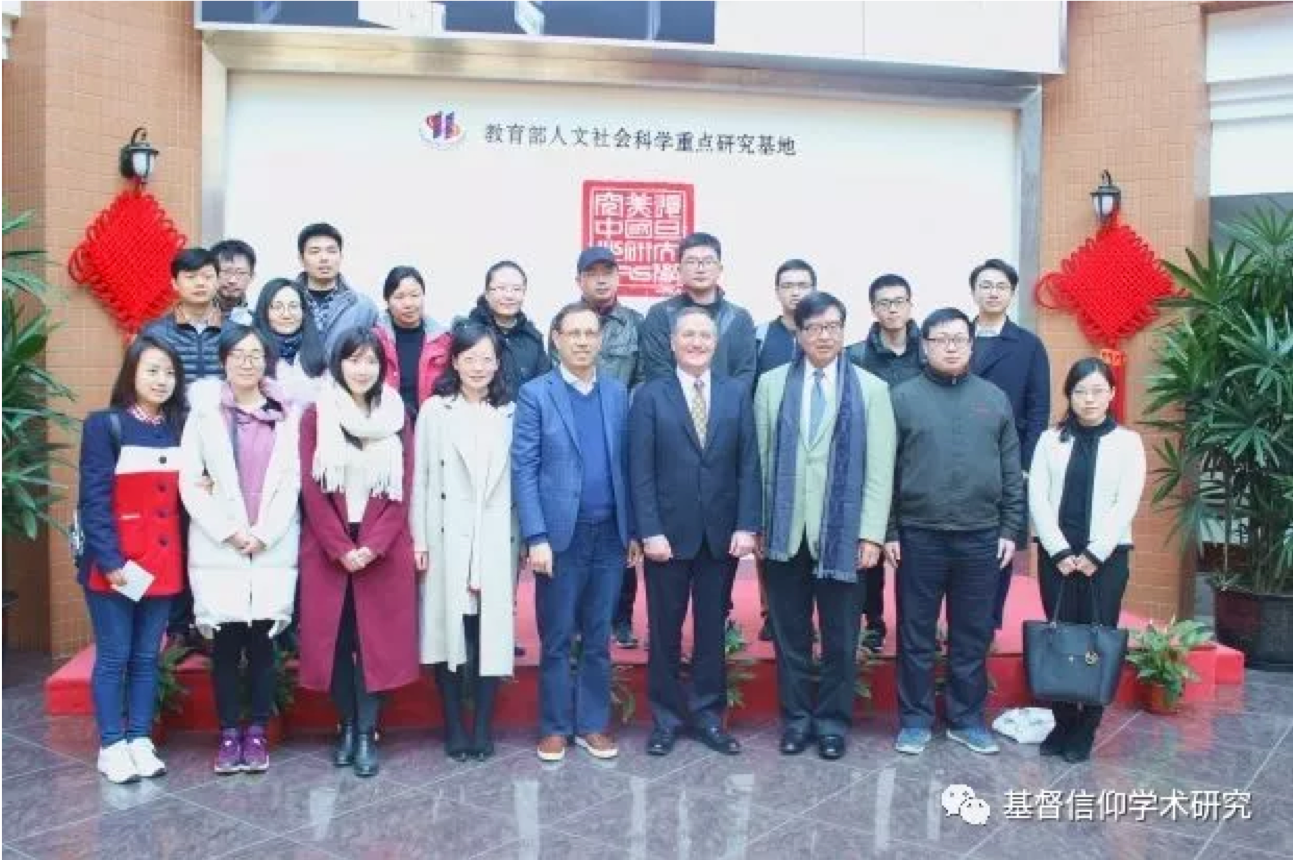
On March 5, 2018, Dr. Brian Grim (Chinese name: Ge Baiyan 葛百彦), President of the American Religious Freedom & Business Foundation, gave a lecture at Fudan University entitled “Religion’s Contribution to the US Economy“. His research found that the annual economic contribution of religion to the United States is as high as about $1.2 trillion.
At 9 a.m. that day, the lecture began at the American Research Center at Fudan University on time and was chaired by Prof. Xu Yixuan, Director of the Department of International Politics at Fudan University. He introduced the speaker to the audience. At the beginning of his speech, Dr. Ge Baiyan quoted an American writer, the old Oliver Wendel Holmes, saying: “Some people are so heavenly minded that they are no earthly good.” But Dr. Ge Baiyan refuted this view, and that being heavenly minded has a very positive effect on the U.S. economy.
Ge Baiyan has a lot of connections with China. He taught in Fujian, Xinjiang, and other places more than 30 years ago. His youngest daughter was the first American born in China since the Cultural Revolution ended. Ge Baiyan was a senior researcher at the Pew Research Center. He and his daughter Melissa Grim conducted a study titled “The Socio-Economic Contribution of “Religion to American Society: An Empirical Analysis” which examines the earthly good of American religion.
The study found that religion contributes 1.2 trillion U.S. dollars annually to the U.S. economy, which is equivalent to the 15th largest economy in the world, and even more than the combined annual revenue of the two giants of global technology, Apple and Microsoft.
 Left: Dr. Ge Baiyan. Right: Professor Xu Yikai. (Photos: The Christian Times / Yao Songshu)
Left: Dr. Ge Baiyan. Right: Professor Xu Yikai. (Photos: The Christian Times / Yao Songshu)
According to the findings of the study, Ge Baiyan shared three major aspects of religious influence on the U.S. economy: religious groups, religious institutions, and religion-related businesses.
In terms of religious groups, annually, congregations including churches, mosques, synagogues, and Buddhist temples contribute US$418 billion to the U.S. economy. Religious believers carried out many economic activities such as providing training, food, and conducting meetings for the churches. At present, there are 420,000 teachers in church schools in the United States, and 4.5 million students attend faith-based primary and secondary schools.
Religions also have a magnetism effect, such as attracting tourists to places of worship. Religious people also conduct a number of public welfare activities such as helping people to abstain from alcohol, seeking employment, and caring for AIDS patients.
In terms of religious institutions, annual charities, medical institutions, and higher education institutions with religious backgrounds have created economic value of nearly US$302.9 billion per year. Such institutions include the Knights of Columbus, the largest Catholic Brotherhood Volunteer organization in the world, Catholic Hospitals and the Brandeis University funded by the Jewish community. In relation to religion-related businesses, they have created an annual economic value of $438.4 billion, including faith-based and faith-inspired businesses. Tyson Foods Inc., the world’s second largest chicken, cattle, pork processing and sales company, hired pastors for its factories to care for employees’ spiritual needs. More than 1,000 U.S. factories hired pastors; C12 Christians (The C12 Group) also established the world’s largest Christian CEO network.
In addition, Dr. Ge Baiyan explained the unique influence of religion on the present world through two issues that they designed: Charity. The first question is whether or not to participate in volunteer activities in the past week? 28% of non-religious people gave affirmative answers, while religious figures were as high as 45%. The second question is whether to donate money or donate money to the poor or contribute time in the past week? Up to 65% of religious people gave affirmative answers, compared with 41% of non-religious people.
Dr. Ge Baiyan also shared a story of his business friend who believes in religion. When he realizes that the purpose of life should not be just self love but love his neighbor, he donated his income, sold all his assets, and moved his family to one of the poorest countries in the world. – Mozambique (Country of Southeast Africa). He now donates 90% of his profits from local companies to local communities.
Finally, Dr. Ge Baiyan cited the words of his university professor as a conclusion that the purpose of social science is to discover new knowledge that is beneficial to people. This is exactly the purpose of Dr. Ge Baiyan’s research.
This lecture was co-sponsored by the Shanghai University Think Tank Institute for Religion and National Security at Fudan University and the School of International Relations and Public Affairs at Fudan University.
